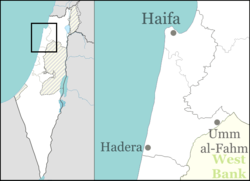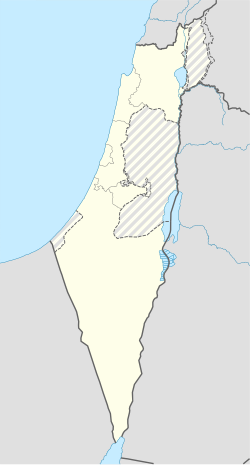Binyamina-Giv'at Ada
Binyamina-Giv'at Ada
בִּנְיָמִינָה-גִּבְעַת עָדָה | |
|---|---|
| Hebrew transcription(s) | |
| • ISO 259 | Binyamína – Gibˁat ʕada |
| Coordinates: 32°31′20″N 34°56′42″E / 32.52222°N 34.94500°E | |
| Country | |
| District | |
| Founded | 2003 – merger |
| Government | |
| • Head of Municipality | Gil Hanania[1] |
| Area | |
• Total | 25,718 dunams (25.7 km2 or 9.9 sq mi) |
| Population (2022)[2] | |
• Total | 16,281 |
| • Density | 630/km2 (1,600/sq mi) |
| Ethnicity | |
| • Jews and others | 99.8% |
| • Arabs | 0.2% |
Binyamina-Giv'at Ada (Hebrew: בִּנְיָמִינָה-גִּבְעַת עָדָה) is a town in the Haifa District of Israel. It is the result of the 2003 merger between the two local councils of Binyamina and Giv'at Ada. In 2022 its population was 16,281.[2] Before the merger, the population of Binyamina was 6,600.
History
[edit]Binyamina
[edit]Binyamina was founded in 1922. At first, the proposed name for the Moshava was "Tel Binyamin", but as the nearby British railway station was called Binyamina railway station, which itself was named after the Baron Edmond Benjamin James de Rothschild, the inhabitants chose to call it Binyamina.[3] Binyamina was founded on PICA land by members of the Third Aliyah and people from the neighboring Zikhron Ya'akov. According to a census conducted in 1922 by the British Mandate authorities, Binyamina had a population of 153 inhabitants, consisting of 137 Jews, 13 Muslims and 3 Christians.[4] In 1946 the Betar Tower and Stockade settlement (which was relocated multiple times) "Nahalat Jabotinsky", named after Ze'ev Jabotinsky became, municipally, a part of Binyamina.[5][6][7] The original economy of the village was citrus-based. In 1947, Binyamina had a population of 2000.[8]
-
Binyamina 1928
-
Binyamina 1934
-
Binyamina 1942 1:20,000
-
Giv'at Ada 1942 1:20,000 (bottom left)
-
Binyamina & Giv'at Ada 1945 1:250,000
Giv'at Ada
[edit]
Giv'at Ada, 'Ada Heights', named for Baron Edmond James de Rothschild's wife Adelheid/Adélaïde (Ada), was established in 1903 by eight families from Zikhron Ya'akov.[9] Giv'at Ada was established as an agricultural Moshava. The main farming branches were field crops and vegetables, and later grapes.[9]
Merger
[edit]The two local councils, Binyamina and Givat Ada, were merged into one authority as part of an initiative by the Ministry of the Interior regarding the unification of local authorities in Israel. The unification was done in 2003 as part of the plan for the revival of the Israeli economy. From the beginning, there was an intention to unite the three settlements into one authority: Zichron Ya'akov, Binyamina, and Givat Ada.[10] Finally it was decided in the Knesset on July 31, 2003, to unify Binyamina and Givat Ada only.[11]
On 13 October 2024, a Hezbollah drone attacked a military base of the Golani Brigade near the town, killing 4 IDF personnel and injuring 67 people, with several critically wounded.[12]
Economy
[edit]
The area is home to both the Binyamina Winery, producers of 2.8 million bottles of wine annually, and the Tishbi Winery, founded by Yonathan Tishbi in 1985. As of 2009, Tishbi produced approximately one million bottles per year.[13][14] Plans have been drawn up to build a 150-acre (0.61 km2) wine park on the slopes between Binyamina and Zichron Ya'akov to promote wine tourism in Israel.[15]
Shuni
[edit]The Jabotinsky Park at Shuni contains a Roman theatre with an adjacent semicircular pool used during the ancient pagan Maiumas water festival,[16] and buildings of the former Arab Palestinian village of Khirbat al-Shuna.

The ancient village of Kefar Shumi or Shami stood close to the springs at the foot of the Carmel ridge whose waters were sent to Caesarea Maritima by aqueduct.[17] In 1902 it was known in Arabic as Shuni and Mayumas.[17]
Transport
[edit]The busy Israel Railways Binyamina Railway Station is the last stop on the Binyamina-Tel Aviv suburban line and a transfer point on the Tel Aviv-Haifa intercity line which makes it a transportation hub for the area. A direct non-stop train from Binyamina reaches Tel Aviv or Haifa in 30 minutes.
Population
[edit]According to the data of the Central Bureau of Statistics, as of the end of January 2023 (estimate), 16,343 residents live in Binyamina-Givat Ada (124th place in the ranking of local authorities in Israel). The population is growing at an annual growth rate of 1.8%. The percentage of those entitled to a Bagrut certificate among 12th-grade students in the year 2020-2021 was 88.1%. The average monthly salary of an employee during the year 2019 was 13,552 NIS (national average: 9,745 NIS).[18]
Notable residents
[edit]Binyamina is the birthplace of the Israeli songwriter Ehud Manor,[19] and is referenced in a number of his songs. It is also the birthplace of the 12th Israeli Prime Minister Ehud Olmert, and basketball player Adi Gordon.[20] Amongst its current residents are famous TV actor Lior Halfon,[21] former Maccabi Haifa F.C. Maor Buzaglo[22]
Sister cities
[edit]References
[edit]- ^ "תוצאות הבחירות המקומיות 2024 סיבוב שני". www.themarker.com (in Hebrew). 11 March 2024. Retrieved 10 May 2024.
- ^ a b c "Regional Statistics". Israel Central Bureau of Statistics. Retrieved 21 March 2024.
- ^ בנימינה - הכפר על שם הנדיב הידוע (in Hebrew). מועצה מקומית בנימינה. pp. 68–71.
- ^ "Palestine Census ( 1922)".
- ^ בנימינה - הכפר על שם הנדיב הידוע (in Hebrew). מועצה מקומית בנימינה. pp. 229–231.
- ^ "Olmert speech at Mishmar Hacarmel". israelforeignaffairs.com. Retrieved 2 March 2023.
- ^ "encyclopaedia judaica" (PDF).
- ^ Jewish National Fund (1949). Jewish Villages in Israel. Jerusalem: Hamadpis Liphshitz Press. p. 24.
- ^ a b "Women on the Map". Archived from the original on 21 July 2011. Retrieved 24 August 2010.
- ^ "הצעת חוק התכנית להבראת כלכלת ישראל 2003" (PDF). 2003.
- ^ "חוק התכנית להבראת כלכלת ישראל (תיקוני חקיקה להשגת יעדי התקציב והמדיניות הכלכלית לשנות הכספים 2003 ו-2004) (מס' 2) – ויקיטקסט". he.wikisource.org (in Hebrew). Retrieved 2 March 2023.
- ^ "Unprecedented Lebanese drone attack wounds 40 near Binyamina, four in critical condition". The Jerusalem Post | JPost.com. 13 October 2024. Retrieved 13 October 2024.
- ^ "About Us". Binyamina Wines. Archived from the original on 17 October 2010.
- ^ Rogov, Daniel (12 August 2009). "Wine and Spirits / Family fortune". Haaretz.
- ^ "Israel seeks to become wine tourism destination". Globes. 17 January 2008. Archived from the original on 5 October 2008. Retrieved 17 January 2008.
- ^ Di Segni, Leah (2023). Two Greek Inscriptions on Mosaics from the Theater at Shuni (PDF), in Atiqot 110, pp. 159-172. Accessed 15 May 2024.
- ^ a b Negev, Avraham; Gibson, Shimon, eds. (2001). "Maiumas (c); Shuni-Mayumas". Archaeological Encyclopedia of the Holy Land. New York and London: Continuum. pp. 309, 468–469. ISBN 0-8264-1316-1.
- ^ "הלמ"ס נתוני בנימינה 2020" (PDF). 2020.
- ^ "Ha'aretz Online: Thousands attend the funeral of lyricist". Archived from the original on 25 October 2005. Retrieved 26 March 2009.
- ^ "עדי גורדון". www.makorrishon.co.il. Retrieved 2 March 2023.
- ^ "אשתו של ליאור כלפון בווידוי מרגש: כך ניצחתי את התקפי החרדה והדיכאון". mynetbatyam (in Hebrew). 24 October 2021. Retrieved 2 March 2023.
- ^ "מאור בוזגלו עוזב את העיר". mynetholon (in Hebrew). 6 November 2017. Retrieved 2 March 2023.
- ^ Gilad, Moshe (6 September 2007). "Choose Your Family". Haaretz. Retrieved 23 April 2019.







